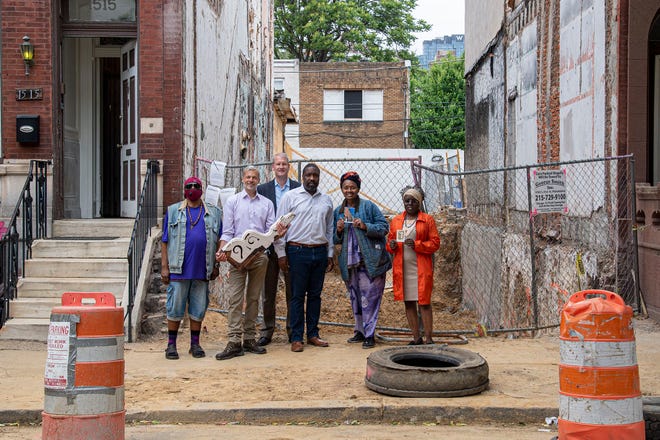get these nets
Veteran
Philadelphia creates its first historic district dedicated to Black history
July 10, 2022
PHILADELPHIA — Philadelphia has its first local historic district designated to recognize its Black history.
The Philadelphia Historical Commission voted unanimously Friday to create the Christian Street/Black Doctors Row Historic District, capping a yearslong effort to preserve the area referred to as a “main street” for upper-middle-class Black Philadelphians in the 20th century. City Council’s one-year demolition moratorium for the six-block stretch of the Graduate Hospital neighborhood expired July 1.
The new designation protects the area against demolitions and adds a layer of review for changes to the exterior of properties.
Concerns about demolitions in 2020 and continued development pressure in the area inspired the nearly two-year effort by the South of South Neighborhood Association and the Preservation Alliance for Greater Philadelphia to lobby for the historic district, backed by the neighborhood’s City Councilmember Kenyatta Johnson. The nomination highlights the cultural heritage and architectural style of the area. The Historical Commission’s Committee on Historic Designation recommended the commission create the district at a meeting last month.
The Christian Street/Black Doctors Row Historic District joins more than 30 districts on the Philadelphia Register of Historic Places. The stretch of Christian Street from South Broad to South 20th Streets consists of 154 properties. People who lived and worked on these blocks include prominent Black doctors, pastors, architects, small-business owners, and politicians. Members of the community called it Doctors Row because of the professionals who lived there and the nearby Mercy Hospital and School for Nurses, a premier Black medical institution.
Supporters of the designation, including Black residents whose families have lived for generations on Christian Street, said Philadelphia’s recognition of Black history and culture in the form of a historic district was long overdue. The Preservation Alliance hopes to replicate Friday’s success elsewhere in the city.
“We are happy that this day has come,” said Vincent Thompson, spokesperson for Johnson. “Philadelphia is now 340 years old this year, and we have never had a historic district created based mainly on the history of Black Americans.”
He added, “We hope it is not the last historic district based upon the contributions of an ethnic group in Philadelphia.”
Sylvia Harrod Blackwell, 94, said her father, Frederick Harrod, was a Black entrepreneur who lived and started his tailoring business — which became a chain of eight dry cleaners — on Christian Street. In video testimony submitted to the Historical Commission, the former Philadelphia teacher said her family also attended the First African Baptist Church at 16th and Christian Streets.
“My father asked me once what I thought about businessmen being on the same level as doctors and lawyers. Professionalism is a term that includes, I learned, doctors, lawyers, businessmen, and educators,” she said. “Calling Christian Street ‘Doctors Row’ celebrates the early contributions made in Philadelphia by Black people.”
The Society to Preserve Philadelphia African American Assets, a group formed to advocate for the preservation of significant historical and cultural properties, supported the creation of the district. But Deborah Gary, cofounder of the organization, said in written comments to the Historical Commission that the historical nomination focused too much on the street’s upper-middle-class Black residents, saying they were a fraction of the Black population there.
At Friday’s meeting, she said that in the future, she hopes “we highlight that the contributions of African Americans is broader than the effort of those that are the well-known and the achieved professionals.” She said the newly created district “represents an actual example of a surviving Black community, which really is based on the workers, the laborers, et cetera” and that they were largely responsible for the stability of the district.

Faye Anderson, a local activist and director of All That Philly Jazz, a public history project documenting and contextualizing Philadelphia’s jazz tradition, rejects the historical nomination’s focus on elite former residents. In written comments to the Historical Commission, she said the nomination is not about Black history and culture but “about preserving the streetscape of six blocks from which African Americans have been displaced in the most gentrified neighborhood in Philadelphia.”
She has said that the district should not be considered historically significant and that other areas of the city that showcase Black history, such as businesses listed in The Negro Motorist Green Book and stops on the Underground Railroad, are more deserving of designation as historic districts.
But supporters of the district said Friday that they want the Christian Street/Black Doctors Row Historic District to be the first of many.
“This is a very important, momentous day that I will never forget,” said Robert Thomas, chair of the Historical Commission. “And I’m sure many people will be influenced by this as well in a very positive manner that we heard from so many people.”
